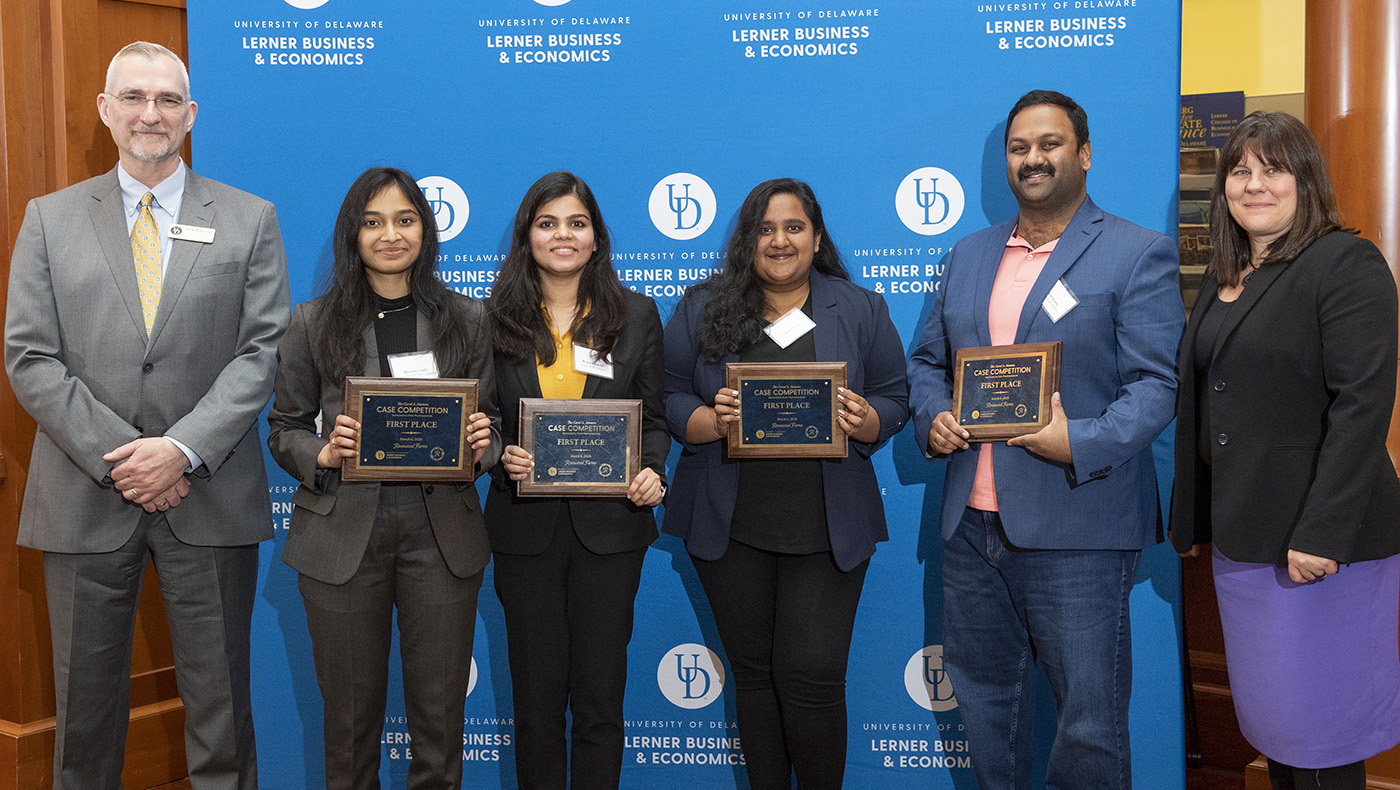Just 15 minutes away from the University of Delaware is a rustic barn that hosts successful weddings and corporate events weekend after weekend. But what occupies this 6,000+ square ft. venue after the final song has played and the tables have been cleared?
Rosewood Farms, a family-owned wedding venue that proudly traces their roots back to UD was the chosen case for the 21st anniversary of the Carol A. Ammon Case Competition, where teams of MBA and master’s students from the Alfred Lerner College of Business and Economics applied their business administration skills to come up with ideas for the augmentation of the Rosewood Farms venue.
Rosewood Farms approached the Lerner College with a purpose: They extended an opportunity for graduate students to find potential solutions for the expansion of their multi-functional institution. Since weddings are widely accepted as weekend events, Rosewood Farms operates well under its capacity from Monday through Thursday. From a business standpoint, however, an open schedule indicates an opportunity for growth.
In the pamphlet handed to the participants, UD alum and Owner and CEO of Rosewood Farms Rick Biddle wrote, “The subtitle to the name of our business is: ‘Weddings and Events.’ Our goals for the future are to have consistent and steady growth. Having hit our goal of 100 weddings booked for 2020, we want to focus on booking other events to fill the space, get people onsite, and to build that revenue source.”
The case was revealed on February 21 and shortly thereafter, the graduate students assembled into nine teams and began to devise structured plans to promote weekday turnout at the venue. For two weeks, the teams remained focused on designing a plan that would best align with Rosewood Farms’ core values and business model. On February 27, at the end of the first week, all of the participants toured the grounds of Rosewood Farms to better contextualize the framework of their looming case presentations. Finally, the teams gathered one last time in the empty classrooms of UD’s Alfred Lerner Hall and Purnell Hall to polish their presentations for the competition the following day on March 6.
This “allows the participants to work together in a team environment in a real-time, real-life basis, meaning that they get to put to good use in a practical way what they learned in the classroom,” said Katalin Takacs-Haynes, associate professor of management, associate faculty director for the MBA program and director of the Carol A. Ammon Case Competition at UD.
On the day of the competition, nine student teams presented their recommendations to Rosewood Farms representatives and other attendees in two 25-minute rounds in the Lerner College’s Graduate Programs Hub on UD’s Campus. Towards the end of the hour, after much anticipation, moderators announced the names of the three teams that scored high enough to advance to the final round: Rare Affairs, East/West Partners and United Nations.
The final three teams gathered in Alfred Lerner Hall to present their top 10 strategic approaches for filling the mostly-open weekday schedule of Rosewood Farms. In the end, Rare Affairs finished at the top, with their winning idea of implementing Indian weddings into Rosewood Farms’ repertoire, among other recommendations such as holding organizational or charity galas and new ideas for corporate events.
Participants Abhi Katta, Bhoomi Gada, Manasi Desai and Richa Kumari of the winning team admittedly took a risk when including Indian weddings in their top three idea pitches, since the guidelines of the case called for participants to venture outside of the nuptial sphere. This seemed to have made a great impression on the moderators and judges who represented Rosewood Farms.
“Personally, I hope to implement Indian weddings,” said Seth Ruffins, a UD graduate and marketing associate for Rosewood Farms. “What’s most exciting about that is 50% of Indian weddings take place on weekdays because astrology tells couples when they’re supposed to get married. So, it’s kind of cool to find a niche that is something so close to what we’re doing with weddings already.”
Overall, the teams were judged on their ability to delve into the case using their analytical skills and creative thinking. The judges also evaluated the teams on the basis of their presentations and their preparedness to address any of the panel’s inquiries.
The Carol A. Ammon Case Competition, like many of the programs offered by the Lerner College, gives students the chance to bolster their knowledge and apply it to real-world circumstances. Although only three finalist teams were awarded plaques and cash prizes for their accomplishments this year, every participant walked away with an improved sense of ingenuity for tackling business-related tasks.
“At UD I learned to think outside of the box,” said Alicia Fox, UD alumna and marketing coordinator for Rosewood Farms. “In order to grow in life, you have to get a little bit out of your comfort zone.”
The Carol A. Ammon Case Competition
The Carol A. Ammon Case Competition gives graduate student teams the opportunity to create and present recommendations for a focal company. The competition enhances students’ analytical and presentation skills, expands students’ business vocabulary and exposes them to a vital audience of regional corporate leaders. The competition is made possible by the generous support of Endo Pharmaceuticals and is named for the company’s founder, Carol A. Ammon.




